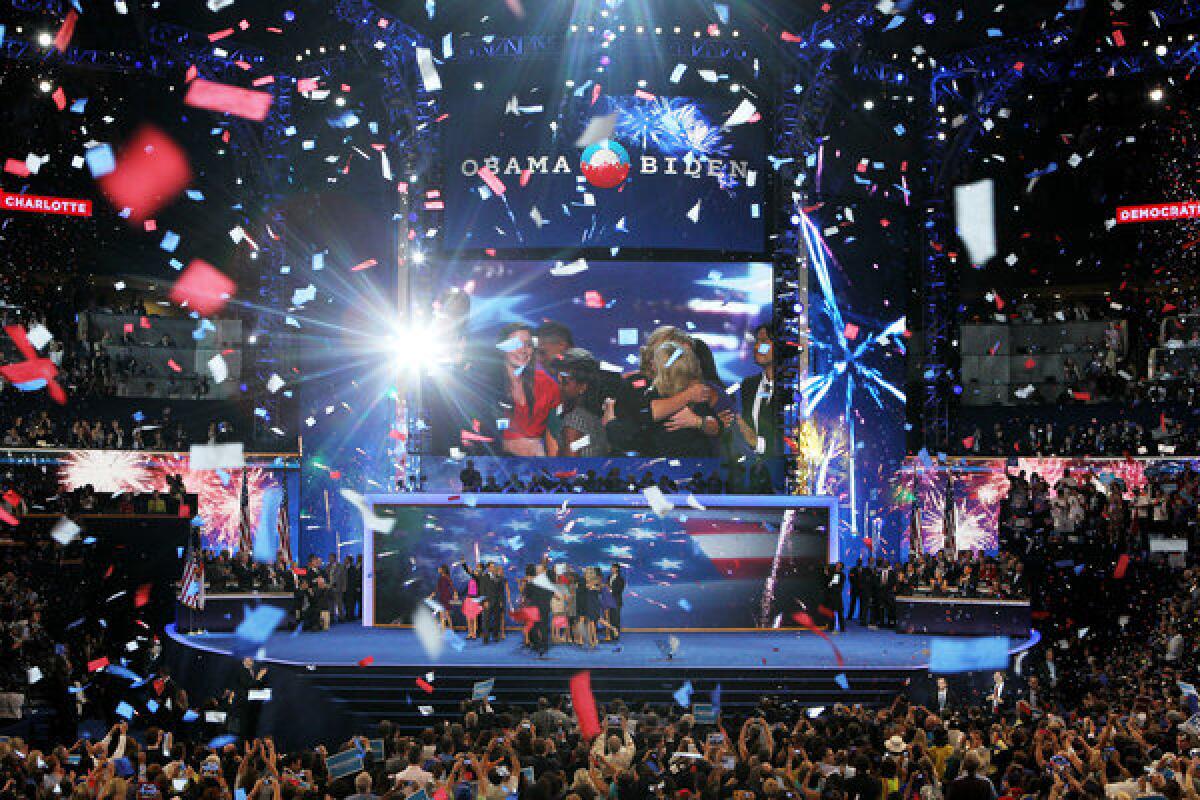McManus: Conventions without compromise

Attending two political conventions back to back is like visiting two parallel universes: one conservative, one liberal; one overwhelmingly white, the other emphatically multiculti; and each one strangely confident that its candidate is on a steady course to victory.
In Tampa, Fla., Republican strategists insisted their faith was grounded in arithmetical determinism: the math of the sluggish economy. No president has ever been reelected when unemployment was stuck as high as 8%, they pointed out.
Democratic strategists put their faith in a different branch of political mathematics: the arcana of the electoral college. President Obama, they said over and over, has “more paths” to 270 electoral votes than Mitt Romney; more states that he could plausibly win.
POLL: After the political conventions, what’s left to debate?
Both campaigns can’t be right, of course. But their mutual conviction that they have the advantage meant that neither side felt it had to move toward the middle. Instead, with both parties focused more on mobilization than persuasion, the conventions were aimed mostly at rousing the faithful.
That’s why, in a year when the public’s overriding concern is the economy, so much time at the conventions was devoted to the social issues that both define and divide right and left in America. The Republicans didn’t shy away from talk about restricting abortion and defending traditional marriage, because so much of their base wants that message. The Democrats were a mirror image, defending abortion rights and applauding as Obama reiterated his support for gay marriage.
And what didn’t we hear from either side? Talk about getting along, healing divides or working across the aisle to end partisan gridlock.
Four years ago, Republican nominee John McCain was graceful in his acceptance speech. “You have my respect and my admiration,” he said in words directed toward his opponent. “Despite our differences, much more unites us than divides us.”
Obama was tougher on McCain, but he also made a plea for finding areas of agreement. “The times are too serious, the stakes are too high for this same partisan playbook,” he said. “So let us agree that patriotism has no party. I love this country, and so do you, and so does John McCain.”
This year, those courtesies were missing in action. “I wish President Obama had succeeded because I want America to succeed,” Romney said, but only as a set-up line for his point: “His promises gave way to disappointment and division.”
Obama’s only nod toward bipartisanship was equally barbed. “No party has a monopoly on wisdom. No democracy works without compromise,” he said. “But when Gov. Romney and his friends in Congress tell us we can somehow lower our deficits by spending trillions more on new tax breaks for the wealthy, well, what did Bill Clinton call it? You do the arithmetic.”
Neither candidate even attempted to explain how he might try to work with the other party if elected. Granted, that’s a hard case for Obama to make after the last three years, but it would have been worth a try. It’s a theme Romney could turn to his advantage, but it might get in the way of GOP mobilization; hard-line conservatives don’t want to hear even a hint of enthusiasm for compromises with Democrats.
Voters who tuned in hoping to learn more details about where each candidate would take the country didn’t learn much. Romney has embraced running mate Paul Ryan’s astringent budget in principle, but he still won’t say exactly how much of it he would pursue in practice. Obama’s campaign promised a concrete plan for the president’s second term, but all he delivered was a list of ambitious goals (1 million manufacturing jobs, 100,000 science teachers).
INTERACTIVE: Outside spending shapes 2012 election
With less than 60 days remaining in the campaign, the arguments do appear, as the strategists say, “baked in.” The candidates will debate three times in October, but that’s more an opportunity for committing gaffes than for proposing new initiatives. And billions of dollars worth of television advertising will flood Ohio, Florida, Virginia and other unfortunate battleground states. The two parties’ vast machinery of mobilization will hector voters to fulfill their civic duty.
But the biggest factor may simply be unexpected events. “In any campaign, at least three things will happen that you don’t expect,” former New York Gov. Mario Cuomo used to instruct aides. “How the candidates react to those events will determine how the election turns out.”
We might see an unanticipated turn in the economy, up or down. It might be a crisis with Iran, which could help or hinder either campaign (a sitting president usually gets a boost from a foreign crisis, but this one could come with a spike in the price of gasoline). Or, because we’re thinking about the unexpected, it could be something that can’t be guessed at.
COMMENTARY AND ANALYSIS: Presidential Election 2012
Neither Romney nor Obama managed to use the conventions to open a commanding lead. That doesn’t mean that their time was wasted. But it does mean that this campaign is likely to remain close, divisive and joyless. It’s going to be a long 59 days.
More to Read
Get the L.A. Times Politics newsletter
Deeply reported insights into legislation, politics and policy from Sacramento, Washington and beyond. In your inbox three times per week.
You may occasionally receive promotional content from the Los Angeles Times.











